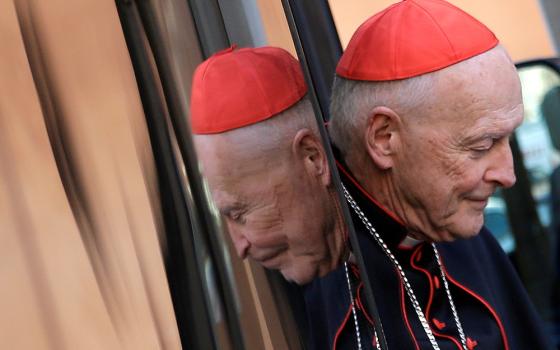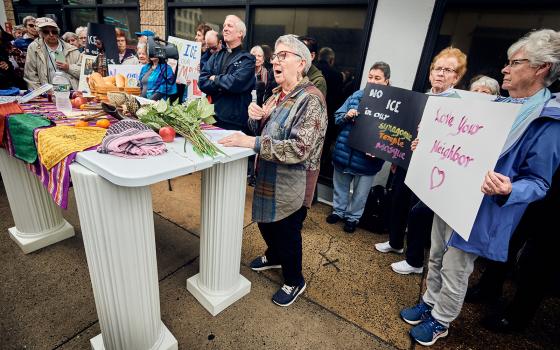
Pope Francis attends an annual gathering of pro-family organizations at the Auditorium della Conciliazione, in Rome, May 10, 2024. (AP/Alessandra Tarantino)
Pope Francis cemented his legacy this past year, appointing friends and allies to key positions and ousting critics.
His crowning project during an October summit of bishops and laypeople was to inject in the Vatican a style of governance based on transparency, accountability and equality.
During this year, Francis attempted to toe the line between increasingly polarized factions in the church and society. As he struggled to be a mediator for peace in the conflicts in Ukraine and in the Middle East, the pope also attempted to hold the tension between progressives and conservatives in the church.
As Catholic women take on greater roles of responsibility in the religious institution and demand empowerment and recognition in the church, Francis stopped short of allowing them to be ordained as deacons.
He defended church doctrine and condemned the practice of surrogacy and the promotion of gender theory.
Despite the pope’s famous opening toward LGBTQ+ Catholics, his commitment to inclusion and welcoming was called into question when he reportedly used anti-gay slurs in private conversations with priests.
At the age of 88, Francis emerged as a pope committed to ensuring that the key aspects of his reform outlive his pontificate. Those who hoped he would usher in a new era of doctrinal opening toward progressive causes were disappointed.
Here were the top five developments:
1. The Vatican condemned surrogacy and gender theory.
Toward the end of 2023, the Vatican department charged with overseeing doctrine issued a document that allowed for the blessing of same-sex couples, causing a stir in the Catholic Church and beyond. The newly appointed head of the department, Cardinal Manuel Fernandez, was seen as a progressive prelate who was willing to embrace new doctrinal interpretations concerning gender and sexuality.
For this reason many were surprised a few months later when Francis strongly condemned surrogacy, which he said "represents a grave violation of the dignity of the woman and the child," and compared it to human trafficking.
In April, the Vatican department on doctrine reinforced the church’s opposition to abortion, surrogacy, gender theory and any attempt to change one’s sex in a document on human dignity. At the international level and in Italy, the Vatican and Francis supported a global ban on surrogacy. Many activists, including members of the LGBTQ community, were taken aback and disappointed by the pope’s pronouncements and asked that Francis, known for his pastoral approach and focus on dialogue and encounter, meet with families who relied on surrogacy to have children and individuals who decided to change sex.
The Vatican has remained firm on its stance regarding surrogacy and Francis met with transgender and intersex Catholics twice in 2024. They asked him to rethink the church’s position on gender affirming care.
2. Francis backtracked on opening toward LGBTQ Catholics.
Shortly after his election in 2013, Francis shocked believers and nonbelievers alike when he famously replied "Who am I to judge?" to a question about gay clergy. It seemed like a sharp contradiction when, last May, Francis expressed his opposition to ordaining gay men to the priesthood during a closed-door meeting with 200 Italian bishops.
Then Francis used a Roman slur to describe gays. "Look, there is already an air of faggotry around, and it’s not good. There is a culture of homosexuality today that makes it so that those who have had a homosexual orientation should not be welcomed (in seminaries)," he said.
While Francis has promoted a more welcoming and open approach to LGBTQ faithful, meeting with gay activists and sending letters to priests committed to welcoming LGBTQ Catholics, he has done little to change official church doctrine, which considers homosexual acts as sin and homosexuality as "intrinsically disordered."
Francis also backtracked on the Vatican decision to allow the blessing of same-sex couples, provided they follow specific rules and procedures that clearly distinguish it from marriage. In an interview with CBS’ "60 Minutes" that aired on May 20, Francis said that blessing gay relationships is "against natural law." He still maintained that priests could bless the individual person. After 11 years leading the Catholic Church, Francis continues to evade attempts to be labeled as either a progressive or conservative pope.
Advertisement
3. Francis dismissed opponents, promoted supporters.
Francis’ pontificate was marked by a surprisingly small, yet resilient cohort of conservative prelates based in the U.S. who opposed his magisterium. In July, the Vatican formally excommunicated one of its principal leaders, Archbishop Carlo Maria Vigano, the former Holy See ambassador to the United States.
Vigano was excommunicated for the crime of schism, which means that he is formally outside of the church and cannot celebrate or receive the sacraments. The move followed other efforts by Francis to eliminate his staunchest opposers, such as removing the conservative social media pundit Bishop Joseph Strickland from his diocese in Tyler, Texas, and stripping Cardinal Raymond Burke, the de facto leader of U.S. conservatism, of his Vatican apartments and salary.
The threat of schism has loomed on his pontificate, but Francis proved to be deft at avoiding threats to church unity. Through official Vatican sanctions and timing, the pope successfully managed dissidents from the left and right wings of the Catholic Church.
In December Francis also celebrated the 10th consistory of his papacy by making 21 new cardinals who will one day be tasked with selecting his successor. With the new batch of cardinals, the pope has successfully remade the College of Cardinals, having handpicked almost 80% of its members. Francis awarded red hats to prelates who represent an increasingly diverse church with a special attention toward the Global South and who are also open to progressive interpretations of Catholic doctrine.
4. The Synod on Synodality is over. Synodality has just begun.
In October, bishops and leaders gathered for a historic summit to discuss the future of the church. The gathering, known as the Synod on Synodality, was poised to address some of the most controversial issues in the church, including the welcoming of marginalized groups and women. It was the result of a three-year consultation and the second such gathering in Rome.
Synodality has become synonymous with a new style of church governance focused on dialogue, inclusivity and listening instead of the traditionally hierarchical structure of leadership in the institution. Bishops, sitting at roundtables with nuns, theologians, activists and canon lawyers, came together for a month to determine what the church is called to be. Expectations were high for the summit, with some hoping it would lead to radical reform while others feared it would change church teaching.
The 52 pages of the final document offered a much less controversial approach, mostly calling for a greater involvement of lay Catholics in the leadership of the church and a reconsideration of the role of bishops. This was partly due to the pope’s decision to put the brakes on some of the most controversial and complex topics of the synod, such as the role of women and LGBTQ people, to 2025 when specific study groups would be asked to present a report.
But synod organizers warned that the process of synodality is far from over. In November, Francis underlined that the final document of the synod constitutes official church teaching and told bishops to prepare detailed reports of how they are enacting its guidelines when they visit the Vatican.
5. It was the year of Catholic women.
The year 2024 will likely be remembered as the year when the cause for the promotion of women in the Catholic Church became mainstream. Not only did women come to occupy some influential positions in the church usually reserved for ordained male clergy, but the growing demand that women be allowed to minister and even be ordained was welcomed and listened to at the highest levels of the institution.
No topic gained more momentum at the synod than the question of promoting women in the church, and particularly the possibility of ordaining women as deacons, who may preach at Mass, lead funeral services and perform baptisms but cannot say Mass, hear confessions or anoint the sick. But Francis told synod delegates the question of the female diaconate was not "mature."
The Holy Father "has asked us not to entertain this possibility now," read a letter by Fernandez on Oct. 21. Despite the Vatican’s opposition, a growing number of Catholics, including bishops, have supported the idea of women deacons. Catholic female activists have reinforced their efforts to challenge Francis on this topic. Having opened the door on discussions regarding the role and leadership of women, it is unlikely that it will be closed in the coming year.




